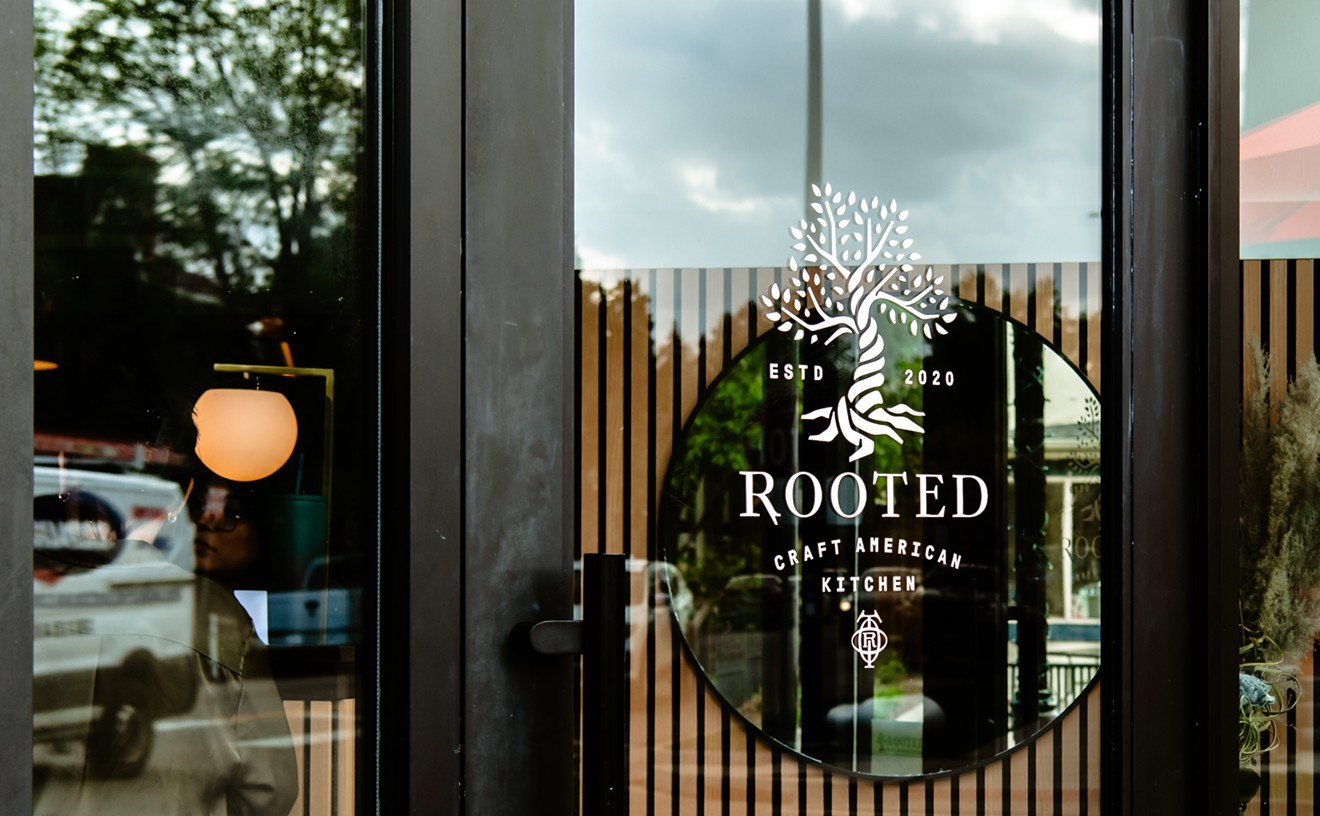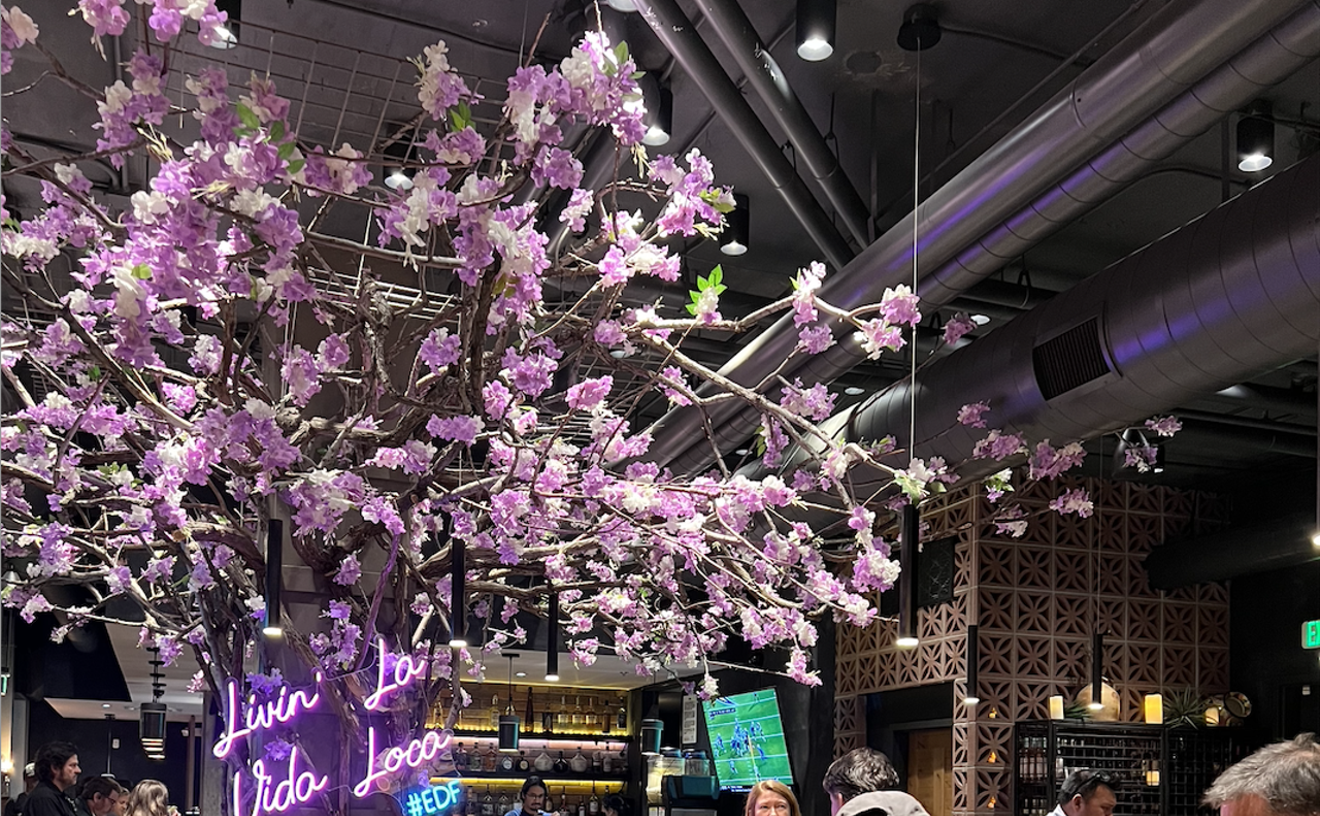Lin, I'm guessing, was not thinking about fettuccine alfredo when he wrote that, but I am. I'm thinking about gloppy alfredo sauce out of a jar from the grocery store, the dim ghost flavors of rubber and chemical stabilizers kicking around the back of my tongue. I'm thinking about the contemporary equivalent, the Olive Garden's alfredo dipping sauce: that cheez-intensive goo, that awful, artificially sweetened, corporate-vetted alfredo-esque nursery-school paste it serves with its breadsticks. One of my service-industry-specific nightmares is that a whole generation of kids will grow up eating at the Olive Garden and assuming that's what alfredo sauce is supposed to taste like. It's not, but a lot of people believe it is, and that's kind of like thinking Crunch Berries are an actual fruit.
Lin probably wasn't thinking about spaghetti aglio e olio when he wrote that either, but I am. I'm thinking about Lisa, one of the few women I've ever worked with in the kitchen -- and the worst by a long stretch. Lisa had a scar running from under one ear, across her windpipe and up to the hinge of her jaw on the opposite side, as well as a second, thinner one that followed underneath the first for about half of its length, as though someone had inexpertly tried to cut her throat, then gone back for seconds. No one ever asked her about the scars -- how do you casually bring up something like that? Worse, what if she decided to tell you? Instead, I spent most of my time patiently trying to explain to Lisa how to do the simplest kitchen tasks -- making rice, tomatoes concassé, dicing onions -- things she would have known had she actually possessed the years of experience she'd claimed on her resumé.
One night we planned to serve spaghetti aglio e olio as a special. This was one of those rare times when I had to consult a cookbook, because aglio e olio is a classic Italian sauce that's easy to screw up if you don't know what you're doing and tough to get just right. So I was hunched over a book with a couple of my cooks trying to figure out the process, when Lisa came over and told us not to worry, that her grandmother made a great aglio e olio, and she knew the recipe. Stupidly, I told her to go for it.
She spent hours making the sauce, which turned out to be the worst thing I'd ever tasted -- like burned garlic in a broth of carbolic acid. We canceled the special that night, limped through service, and Lisa was a no-show the next day. And the day after that. And the day after that. In fact, she never showed her face in the kitchen again, and I inherited her knife kit -- a few hundred dollars in assorted culinary-school Sabatiers, very poorly cared for.
And it's very unlikely that Lin was thinking about eggplant, but I am. I'd always hated eggplant, because the only eggplant I'd ever eaten was eggplant I cooked myself, and I'm apparently incapable of making good eggplant. Because I was an arrogant young cook, I figured eggplant was just nasty, and if I couldn't do anything with it, no one could. Now, however, I realize it's a genetic thing. Somewhere buried deep in the twisting double helix that turned me into a cook is a broken base pair in my eggplant gene. I burn it, undercook it, turn it mushy with too much oil, over-bread it, under-salt it -- it's always something, but it's always my fault. I know that because I've finally had eggplant done right, done perfectly, done better than I (still stubbornly clinging to a few shreds of my former culinary hubris) ever thought possible.
Bambino's Ristorante, an eighteen-month-old Italian eatery in the Golden Triangle, serves a melanzane e pomodoro that's changed the way I'll think about eggplant (and my own cooking skills) forever. It stirs up an alfredo sauce that should be given like a polio vaccine to babies still cutting their teeth, inoculating them for life against the evils of Olive Garden, and an aglio e olio that brought up the specter of Lisa -- a person I hadn't thought of in years -- and her awful, awful version of this delicate classic.
On the inside fold of Bambino's menu is that quote from Lin Yutang, printed all alone on the page: "What is patriotism but the love of good things we ate in our childhood?" Fourteen words from a Chinese writer dead almost thirty years on the menu of an Italian restaurant in Denver, Colorado, but more lovely and more true than any of the 200,000 of mine that have seen print on these pages over the past year. What is love of one's country but the love of its food? And, by extension, what more grievous insult than to have someone else -- a corporation; a crazy, talentless, possibly suicidal line cook; some arrogant, mutt-Irish hack -- do that food badly?
At Bambino's, seated at a table draped in a wine-colored cloth, surrounded by shopping-mall prints of the Venetian canals and old Campari advertisements in a dining room that looked less decorated than set-dressed as a Hollywood location scout's ideal image of an Italian-American street-corner trattoria, I ate eggplant. I had a single bias-cut, quarter-inch thick slice of melanzane, gently breaded, then sauteéd in good olive oil to exactly the point at which the crust had browned, the skin had crisped, and the meat inside had turned soft and sweet and tender as Wonder Bread. It was beautiful. This was the mark I'd been aiming for and repeatedly missing as I abused the vegetable in my own kitchens for over a decade. This eggplant was an epiphany, and it was so simple -- the way any epiphany ought to be: One perfect slice of the vegetable topped with three wedges of marinated Roma tomato and mounted on a bed of greens dressed in a powerful, house-made Italian vinaigrette.
An order of cozze impepate brought green-lip mussels split and steamed in a white wine, lemon and butter sauce. To the French (or to a French-trained cook), this sauce is beurre blanc, one of the basics, schoolboy stuff -- but there are times when you sit down in a place like Bambino's, taste something, and know without a doubt that there are Italian cooks who've forgotten more about making sauces than the French ever knew. This was one of those times. While the green lips themselves were big and meaty, I prefer mussels that are smaller and sweeter. These had more murky, low-tide funk than I like, but they lent a muscular, seafood-funky flavor to the broth. I would have paid good money just to sniff the steam coming off the bowl.
So while I left two of my six mussels behind, I sopped up every last drop of that sauce with Bambino's dinner rolls. Crusty, dense and made in-house by the thousand every morning, the rolls are perfect for mopping up every last drop of sauce, juice and gravy off every single plate put in front of you. They come with a little soufflé cup of compound gorgonzola butter that -- if I had my way -- Bambino's servers would start selling on the street corner in little vials, like crack. I'd buy. Everyone I ate with at Bambino's would buy. Hell, I'd probably mainline the stuff if my blood weren't already 90 percent butterfat.
The gorgonzola butter was so good that it overshadowed the milder garlic butter and a nice, sweet marinara that came with Bambino's skippable garlic bread. That same marinara also graced a plate of calamari frito misto--tender, breaded squid rings, almost impossibly uniform in size and cut, fried golden and served hot and greasy -- as well as the overcooked ravioli tostati degli spinaci. The little pillows of deep-fried ravioli stuffed with three cheeses and shredded spinach were homemade, but Bambino's makes them in large batches and then freezes them. Unfortunately, they tasted that way: like frozen ravioli that were fried too long in order to take off the frost.
But Bambino's redeemed itself with an aglio e olio that shows exactly why this dish deserves to be a classic: oil and garlic, fresh herbs and gentle spices all in perfect harmony, then anchovy to seal the deal. I tried spaghetti (store-bought, like all of Bambino's pastas, but bought from a store in Italy, so that's something) dressed in simple oil and Roma tomatoes with fresh basil, and more spaghetti in a proper red sauce -- long-simmered, sweet and made with a meat base, not jumped-up with a handful of ground chuck right before service.
And then there was Bambino's fettuccine alfredo -- real alfredo that the kitchen makes in a pan, one order at a time, evenly flavored with (not made exclusively of) hard cheeses carefully melted into emulsified butter and cream. "A right sauce," as one of my old chefs would have said, which means that every restaurant that does alfredo differently is doing it wrong. Remember those guys from GoodFellas? The ones in the prison scene who are making dinner? Those guys should go around the country tasting alfredo sauce, and when they find a restaurant that's doing it wrong -- that's doing it Olive Garden-style, or trying to pass off that rotten powdered shit you mix with water and leave on the steam table for eight hours as the real thing -- they should bust the place up a little. Break a few kneecaps, take away the red-and-white-checked tablecloths and all the Frank Sinatra CDs behind the bar. Doing it the right way, the way Bambino's does it, is easy. Butter, cream and cheese, a little of this, a little of that for flavor, and that's it. No excuses.
Finally, Bambino's pesto provided another simple pan-sauce epiphany: fresh basil -- a ton of fresh basil -- along with pine nuts, olive oil and garlic. Bambino's pesto was so powerful, so fresh and robust, that it exploded with every bite, bursting like a big, warm mouthful of garlic paste chased with a fistful of basil-flavored Pop Rocks. People say it's tough to find good Italian food in Denver, but that's inaccurate -- it's just way too easy to find bad Italian. Why can't every kitchen make pesto this way? How tough is it to remember that list of ingredients? Not tough at all -- but it's cheaper, faster and more convenient to do it wrong. Easier, still, to forget that food has soul, that it comes from somewhere, that there is a right way to do it and that right way never involves a vacuum-sealer, red dye number 5 or a chemistry set.
I was tasting life in that pesto -- basil that had been torn from the earth, living, not long before. I was tasting experience, the work of hands that understand how to make pesto right, how to make a good red sauce, how to make melanzane like I've never tasted before, because Bambino's is a labor of love by Mark and Clyde Canino, whose relatives have been cooking up Italian food in the Denver area since the 1950s.
I was tasting pride. As I worked my way up and down Bambino's long menu and short wine list, I kept thinking of Lin Yutang's quote. Love of country, love of the past, love of your roots -- that's what I was tasting at Bambino's. And that flavors everything.










